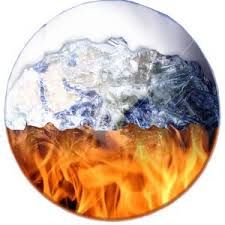
Global warming means arctic melting.
In the State of Wisconsin, USA, where much of my extended family still lives, winter temperatures have sunk as they did 50 years ago when I grew up there. A stretch of 20 degrees Fahrenheit below zero for a few weeks in January seemed normal. We have seen fewer stretches like that in recent decades, that is, until this winter, 2013-2014.
Pipes froze in the oldest of my family’s Wisconsin properties a few weeks ago, causing a small crisis team to descend upon La Crosse for an emergency plumbing party. Talk of global warming filled the conversations more often than usual as we replaced galvanized with pex, and those conversations persist even now in my mind.
So news in the past week of Arctic warming caught my attention. A large crisis now shakes the far north as melting ice and snow push ice flows out faster than ever before. How does my home state, Wisconsin, freeze while just a thousand miles north the pole smothers in relative heat?
One article caught my searching attention today that explains how Arctic air structures resemble a layered cake. Unlike the jungles in tropical parts, the north and south poles retain their heat with layers of different temperature and density air, and some of the layers invert by putting hotter layers above colder ones. In contrast, tropical hot air launches miles high during frequent rain storms, dissipating heat into space.
No one else appears to piece together cold Midwestern winters, hot tropics, and warming poles, but here’s my take on it nonetheless. As a pole warms, layers of heavy air press cold air away from the pole and out towards the mid latitudes including Midwestern America, Europe, and Russia. Perhaps the planet’s spin or magnetism compresses its polar layers. Those layers retain heat that melts polar ice and sends warmer water to the ocean. The tropics, on the other hand, warm with the extra energy in the oceans as well as more direct sun exposure.
Human influence on weather from fossil fuel burning, cement making, and jungle deforestation has produced and will likely produce future ocean warming. However, since the poles will not send warmth away to outer space, they will heat up faster than the rest of the world. Rising shore lines might create larger crises that attract the world’s collective attention in the coming decade. But what about today? What about contemporary policies on human influences on global weather? Despite my scientific skepticism over lack of long term data to assess those human influences, the last 25 years of political clamor on the topic consistently and with increasing supporting data suggest changes to human activities on a large scale should be a priority topic of conversation among us all.
Why don’t all building codes require priority attention to solar, wind, and similar renewable tech for new construction, for example? Why don’t car makers sell existing battery tech to offer more electric vehicles for emission control? Why aren’t we all taking control of what we can control to improve the environment of our world? What do you think?
http://www.livescience.com/43045-arctic-warming-linked-stratified-air.html
http://nsidc.org/cryosphere/arctic-meteorology/climate_change.html
http://en.wikipedia.org/wiki/Global_warming
http://www.weather.com/news/science/environment/arctic-blast-linked-global-warming-20140106
http://www.ncpa.org/pdfs/st321.pdf

It’s an interesting topic and one that’s sure to find a lot of opinions expressed on both sides of the argument. You ask: Why don’t all building codes… why don’t car makers… and the answer, it seems to me is really a simple one: greed. Car makers cannot sell electric cars in the same number as fossil fuel driven cars because they’re too expensive. Currently we have a health crisis in this country and it’s not going to go away. The result is a rapidly disappearing middle class that can no longer afford to go out to eat a couple of nights a week with the resultant closing of restaurants that cater to the middle class (i.e. Olive Garden). Money concerns are paramount and those concerns are at the forefront of your question. We’re not going to see much change in regards to global warming because it’s still largely “unreal” to much of the population. What IS real is the cost of gas… the cost of food… the cost of healthcare… the cost of medications.
I might prefer “short term focus” to “greed,” but I get your point. Most of us focus on our immediate needs and leave the rest to powers beyond our personal control. Is this a good thing? Meaning, should we be satisfied with this condition?
Is it a good thing (i.e. focusing upon our immediate needs and desires)? Probably not but it seems reasonable. As an example I might use my own “pain experience” through which I am presently going. I’ve been in almost continuous pain for two weeks now with the only respite being what is provided by the medications (bad back which occasionally acts up). That “need” trumps everything since it demands my focus. I have very little to say contrariwise. It awakens me after a few hours of sleep forcing me to wander through the house to relieve the pain. I’m not complaining… we all have our crosses to bear. I’m just using this as an example since it is foremost in my mind right now. Young newly-weds are focused on putting food on the table and trying to find a mortgage. I don’t imagine they are overly concerned with what is happening to the polar regions due to global warming and thanks, in part, to fossil fuels. About all they can focus on is to find enough money to put fuel into their car in order to get to work. I fully agree that we should “not” be satisfied with this condition but…. 🙁